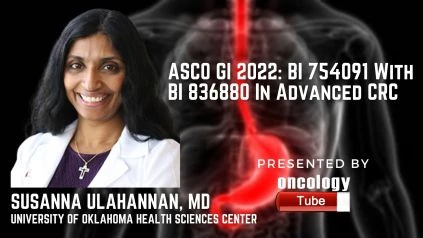Susanna Ulahannan, MD, MMEd, Assistant Professor, Associate Director Phase 1 Unit at University Of Oklahoma Health Sciences Center. In this video, she speaks about the ASCO GI 2022 Abstract – Ezabenlimab (BI 754091), an anti-PD-1 antibody, in combination with BI 836880, a VEGF/Ang2-blocking nanobody, in patients (pts) with advanced colorectal cancer (CRC).
Â
Origins:
Â
Anti-PD-1 antibodies may work in tandem with other immunomodulatory or targeted drugs. The combination of ezabenlimab, an anti-PD-1 antibody, and additional medicines is being investigated in this open-label, Phase II platform trial. The platform’s Module C is evaluating ezabenlimab plus BI 836880, a humanized bispecific nanobody that targets VEGF/Ang2. Pts are being enrolled into one of five advanced solid tumor cohorts: gastric/gastroesophageal adenocarcinoma; solid tumors (except non-squamous NSCLC or melanoma) with secondary resistance to anti-PD-(L)1 treatment (progression after at least SD for at least 4 months); solid tumors with primary resistance to anti-PD-(L)1 treatment (progression after at least SD for at least 4 months); The data presented here is from the CRC cohort that has completed recruiting.
Â
Methodologies:
Â
Patients with MSS CRC that were locally progressed, unresectable, or metastatic were included in the study. Patients had previously had one course of systemic therapy for metastatic illness but had never received anti-PD-(L)-1 therapy. Anti-angiogenic therapy was allowed prior to the procedure. For one year or until illness progression, consent withdrawal, or excessive toxicity, patients were given BI 836880 720 mg with ezabenlimab 240 mg iv q3w. OR investigator-assessed as the primary endpoint (CR or PR per RECIST v1.1). Secondary objectives include duration of response, disease control, and PFS, as well as safety.
Â
Findings:
Â
Thirty patients were treated, with 57 percent of them being male and a median age of 61.5 years. All of the patients had previously received chemotherapy, and the majority of them (23 [77 percent]) had previously received bevacizumab. At the time of the data cut-off (September 2021), the median length of therapy (range) was 115.5 (28–295) days, with 6 people still on it. 1 (3% of patients who had not previously taken bevacizumab) had a verified PR, while 16 (53%) had SD. SD lasted 128.5 (42–242) days on average (range). An AE (any/G3/G4) was found in 29/17/2 (97/57/7 percent) of the points. Nausea (40/10 percent), fatigue (30/3 percent), peripheral edema (30/0 percent), vomiting (27/7 percent), and hypertension (27/17 percent) were the most common AEs (any/G3). There were two G4 AEs (hypertension and a reduction in platelet count) but no G5 AEs. A drug-related AE (any/G3/G4) was reported in 24/10/2 (80/33/7 percent) of the patients, with nausea (33/7 percent), fatigue (27/3 percent), and hypertension (27/17 percent) being the most common (any/G3). An infusion-related response occurred in 3 (10%) of the patients (G1, n = 1; G2, n = 2). An AE resulted in the discontinuation of 2 (7%) of the points (G3 bile duct stone and G2 peripheral edema). Immune-related AEs were observed in 6 (20%) of the patients, and significant AEs were reported in 13 (43%) of the patients.
Â
Outcomes:
In patients with advanced MSS CRC, BI 836880 plus ezabenlimab exhibited a tolerable safety profile; nevertheless, anti-tumor effectiveness was restricted in these patients, the majority of whom had already received bevacizumab. NCT03697304 is the number for the clinical trial.

